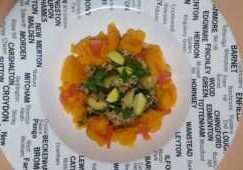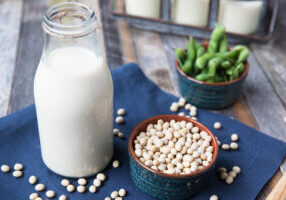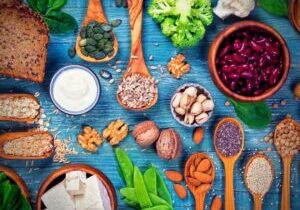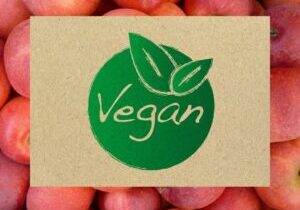One of the four most commonly given reasons for adopting a plant-based diet is concern for one’s health. Sometimes, a health problem becomes evident and so you consider changing your diet. At other times, you adjust your diet because all is well… and that’s exactly how you want things to remain!
Good health is precious; but it is also precarious. Many seemingly invisible things affect it and, unfortunately, good health is easy to lose. Although there is no guarantee that a plant-based diet can solve every health issue, there is a growing bank of evidence – as apparent from hundreds of studies made by medical and nutritional scientists – indicating that the vegan diet can make a significant, positive difference to long-term health.
This Diet Pays Dividends
 Notable studies comparing plant-based and omnivorous diets find that vegans tend to have:
Notable studies comparing plant-based and omnivorous diets find that vegans tend to have:
- lower body mass index (BMI) than non-vegans
- lower risk of hypertension
- lower risk of Type 2 diabetes
- low serum lipids (these are circulating fats)
- lean physiques
- lower risk of obesity
- decreased risk for some cancers (ie. breast, prostate, colon)
- for vegan males, a lower risk of ischaemic heart disease
- for vegan males, a lower risk of death from cardiovascular disease
In addition, for some people, the vegan diet:
- reduces the inflammation and severity of rheumatoid arthritis
- increases the intake of phytochemicals, thought to contribute to a lower risk for cancer
- reduces coronary stenoses (when an artery in the heart becomes narrowed or blocked)
- improves diabetic control
- lowers high blood pressure
- improves health of the gut by promoting beneficial bacteria there
Invest in the Sources of Good Health
 A diet of any sort includes protein, carbohydrate, fat, water, vitamins and minerals. Set amounts of each nutrient are recommended per day, but rarely are specific sources recommended. Yet, it is the source of a nutrient that can make the difference between poor and optimal health.
A diet of any sort includes protein, carbohydrate, fat, water, vitamins and minerals. Set amounts of each nutrient are recommended per day, but rarely are specific sources recommended. Yet, it is the source of a nutrient that can make the difference between poor and optimal health.
An example to demonstrate this difference is the food substance called trans fats or trans fatty acids. Trans fats are oils, normally liquid at room temperature, that are hydrogenated or partially hydrogenated, in a process that turns them into solid or semi-solid fats.
After decades of use in margarine, shortenings, baked goods and some snack foods, they have been recognized as being of no value to human health and with no safe level of consumption. The World Health Organization recommends an intake of less than 1% of total calories from them but has the goal of ‘eliminating industrially-produced trans-fats.’ It hopes to achieve this goal by 2023.
Throughout their years of use, these fats were included in pastries, fried foods, snacks and some restaurant meals – as well as in the spreads you might have put on your toast every morning. Often, they were not clearly labelled. Yet, all the while, they were acting on human health in a harmful way to contribute to coronary heart disease, diabetes, stroke, obesity and elevated cholesterol levels.
If the original oils had not been processed into trans fats, these health problems are unlikely to have occurred, especially to the extent they have. The source of the trans fats was a chemical invention: the process the natural oils were put through to alter them and make them dangerous.
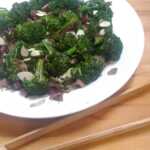 Here is another example of the importance of food source; again, it is from the nutrient class, fats.
Here is another example of the importance of food source; again, it is from the nutrient class, fats.
Omega-3 fatty acids are natural fats necessary to health. Adequate intake of omega-3s protects cardiovascular health, cognitive function, the health of the eyes and is of benefit to many aspects of general health. Pregnant and lactating women should eat a diet rich in omega-3s. This is to ensure they pass on the nutritional and preventative qualities of these fatty acids to their baby, especially at this time, when the child’s eyes and brain are developing.
Omega-3 fatty acids are strongly associated with fish oil because a common omega-3 supplement is cod liver oil. The cod feed on tiny plants called micro-algae, which supply them with omega-3 fatty acids. Micro-algae grow in water, and currently the water can contain pollutants such as mercury or pesticide residues. Animals – or in this case, fish – concentrate any contaminants they ingest with their food. The poisons are concentrated in their tissues, especially their liver. When cod liver oil is taken as a supplement, these concentrations of contaminants pass to the consumer along with the omega-3s.
Omega-3s are available from other plants, too; not just micro-algae. The foods especially rich in them include flax seed, flax seed oil, chia seeds, hemp seed oil, pumpkin seed and walnuts. As well, soya, its many products and all green foods contain omega-3 fatty acids.
You can see that the benefits of the omega-3s are highly dependent on the source of them. Are those sourced from the liver of a fish, complete with concentrated contaminants, truly benefiting the pregnant woman? Or might a plant-based source be better for her?
Obtaining adequate amounts of omega-3 fatty acids from a plant-based diet is a simple matter. Choose one or more of the highlighted foods, above, and aim to consume 1 Tablespoon of oil or 2 Tablespoons of the ground seed each day. Store the oils in dark bottles in the fridge. Drizzle these oils over cooked grains, toast, baked potatoes or salads; sprinkle the freshly ground seeds over porridge, salads, steamed rice or couscous.
In this way, you will be getting omega-3s in small but regular amounts from the beans, grains and vegetables you eat; and in reassuring amounts from the nuts and seeds and their oils.
Your Investment Portfolio
You can learn the best sources of every class of nutrient to find those that are sure to benefit your health, now and in the long-term.
 Carbohydrates provide most of the fuel your body needs to function. They are made up of simple sugars and complex carbohydrates that include fibre. Generally, the more a carbohydrate is processed or refined, the less value it is to your health. Over-consumption of highly-processed carbohydrates, such as sugars, is linked to obesity and diseases of excess. On the other hand, carbohydrates from whole grains, for instance, provide the fuel you need in a slow-release, high-fibre way because they have not been highly-refined.
Carbohydrates provide most of the fuel your body needs to function. They are made up of simple sugars and complex carbohydrates that include fibre. Generally, the more a carbohydrate is processed or refined, the less value it is to your health. Over-consumption of highly-processed carbohydrates, such as sugars, is linked to obesity and diseases of excess. On the other hand, carbohydrates from whole grains, for instance, provide the fuel you need in a slow-release, high-fibre way because they have not been highly-refined.
 Proteins are involved in all living processes and are especially important to tissue building, maintenance and repairs. Although protein is strongly associated with meat, in fact, it is present in every living thing and in anything that once was alive.
Proteins are involved in all living processes and are especially important to tissue building, maintenance and repairs. Although protein is strongly associated with meat, in fact, it is present in every living thing and in anything that once was alive.
All plants contain protein. The amount of protein we need varies according to our age, state of health, level of activity and, to some extent, our gender. Many people actually consume too much. A good way of choosing the source of your protein is to see what it comes with: this is currently called the ‘protein package.’
An animal-based protein package generally comes with a surfeit of saturated fats, some minerals and vitamins, plus various contaminants from the creature’s own diet that have been stored in its flesh. A plant-based protein package includes a range of essential fatty acids, simple and complex carbohydrates, fibre, vitamins, minerals and numerous phytochemicals such as antioxidants.
 Fats are necessary for good health. They provide for stored energy and act as vehicles for nutrients such as fat-soluble vitamins to be moved around the body. Fats are present in every body cell. Choosing healthy fats makes a huge difference to long-term health. Ask yourself, ‘Is this fat going to deliver good health as a return on my investment in it?’ If its source is a plant, chances are it will, especially if you spend a little more and buy organically grown, unrefined and cold-pressed fats and oils.
Fats are necessary for good health. They provide for stored energy and act as vehicles for nutrients such as fat-soluble vitamins to be moved around the body. Fats are present in every body cell. Choosing healthy fats makes a huge difference to long-term health. Ask yourself, ‘Is this fat going to deliver good health as a return on my investment in it?’ If its source is a plant, chances are it will, especially if you spend a little more and buy organically grown, unrefined and cold-pressed fats and oils.
Vitamins and minerals are present in minute amounts in your food, and that is definitely the best place to source them! Supplements can be of use sometimes, but there are still questions as to their long-term safety and the consistency of their effects on health. This is because, most often, supplemental nutrients are manufactured in a laboratory or are ingredients that have been isolated or extracted from a whole food. In both cases, the substances that naturally would enhance or moderate the effects of the nutrients are not available.
Some of these nutrients – such as vitamin A, iron and vitamin B12 – are strongly thought to be available only from animal-products. Not so. When you obtain these nutrients from animal-based foods, you should be aware that the animal has almost certainly obtained them for itself by manufacturing them from substances in the plants they have eaten! So can you!
 When vitamins and minerals are supplied through the plant-foods you eat, they come in nature-measured quantities and in company with phytochemicals, which are natural plant substances that affect how nutrients work together. When you source vitamins and minerals from plants, your body is stimulated to absorb what you need in just the right amounts and also to manufacture its own nutrients from the materials your diet supplies. Clever body.
When vitamins and minerals are supplied through the plant-foods you eat, they come in nature-measured quantities and in company with phytochemicals, which are natural plant substances that affect how nutrients work together. When you source vitamins and minerals from plants, your body is stimulated to absorb what you need in just the right amounts and also to manufacture its own nutrients from the materials your diet supplies. Clever body.
Investment Strategy
Smart investment requires two things: a little time to learn about the best nutrient sources and a little extra money spent on buying the best available. But don’t worry about the money: everything about a plant-based diet is generally much cheaper than an omnivorous diet. Any ‘extra’ spent – on good fats for example – is more than off-set by the savings you gain buying whole, plant-based foods.
For instance, currently a 2kg (4.4 pounds) sack of dried beans costs about 3.70 (pounds or dollars). It almost doesn’t matter what the currency is because it amounts to the same ratio: about .14 (pence or cents) per cup of dried bean which, once cooked, will provide a substantial meal for two to four people.
Cutting Your Losses
Poor health is very costly. Do your sums! Add up the expenditure in time, the cost of medical care and the fees for hired help and support. Before you get to the final tally, remind yourself how poor health creates a powerful feeling of loss: it robs you of your quality of life.
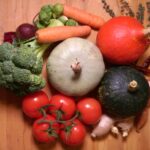 It makes sense to do everything you can to prevent that happening. A plant-based diet is a powerful tool to build and maintain excellent health. In fact, it can also help to reclaim good health! Your body rebuilds itself, cell by cell, on a regular basis. By giving it good materials to work with, you can turn your small, daily investments into a life time of wealth.
It makes sense to do everything you can to prevent that happening. A plant-based diet is a powerful tool to build and maintain excellent health. In fact, it can also help to reclaim good health! Your body rebuilds itself, cell by cell, on a regular basis. By giving it good materials to work with, you can turn your small, daily investments into a life time of wealth.
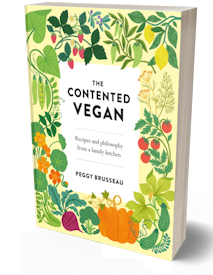
THE CONTENTED VEGAN is a complete guide to the emerging vegan lifestyle. Based on two decades experience of raising a vegan family.
Read Peg's Newsletter...
It's free & fun!
I don’t know if you find it hard to remember web links that are impossibly long and full of gobbledygook?
If you are, then I’ve got some good news…
We’ve made it incredibly easy for you to share a link to my book with your friends – in a way that doesn’t require a degree in programming!
Simply give them this link–
“get.veganbook.today”
No www or anything else – just get dot veganbook dot today. That’ll do the trick – try it!







